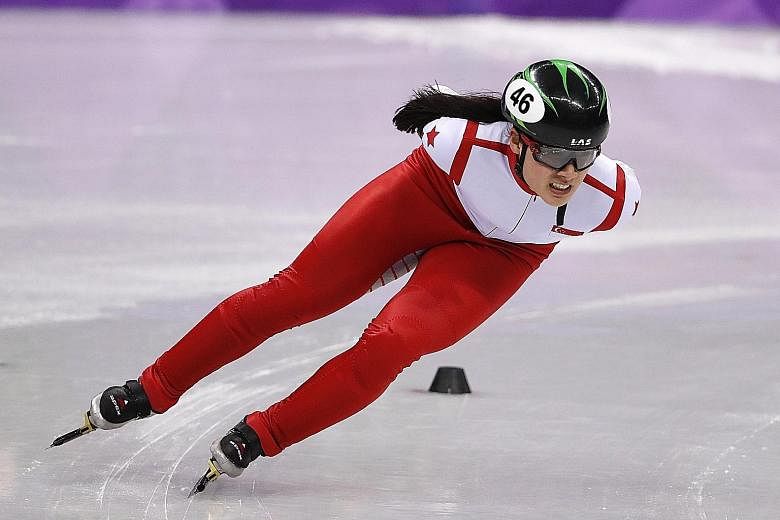Tropical countries whose citizens enjoy sunshine and intermittent rain all year round are not really regarded as obvious nurseries for winter athletes. So how did nations like Singapore and others end up competing at the Winter Olympics? The Straits Times digs into the Olympic history books to find out.
Singapore is one of five tropical nations that made their Winter Olympics debut in Pyeongchang, with short track speed skater Cheyenne Goh finishing 28th overall in the 1,500m event on Saturday (Feb 17).
No tropical country has won a medal at the quadrennial Games, although the Southern Hemisphere did celebrate its first two champions at the 2002 Salt Lake City Games, where Australian Steven Bradbury unexpectedly triumphed in the 1,000m short track speed skating final and aerial skier Alisa Camplin won gold as well.
According to the Olympic Channel, a total of 37 tropical countries have participated at the Winter Games. Apart from Singapore, Malaysia, Nigeria, Eritrea and Ecuador also made their debuts in South Korea.
Closer to home, the Philippines' alpine skiers Ben Nanasca and Juan Cipriano were South-east Asia's first representatives when they competed at the 1972 Games in Sapporo, Japan.
Progress has been slow but steady. The region has a record 10 athletes from five countries (Singapore, Malaysia, Thailand, the Philippines and Timor Leste) at the ongoing Pyeongchang Games.
-
TROPICAL NATIONS' GAMES DEBUT SINCE 2002
-
2002
Cameroon
Hong Kong
Thailand
-
2006
Ethiopia
Madagascar
-
2010
Ghana
Cayman Islands
Colombia
-
2014
Dominica
Timor Leste
Togo
Zimbabwe
Paraguay
Tonga
-
2018
Singapore
Malaysia
Nigeria
Eritrea
Ecuador
Mohamad Fadzli Johan, president of the Ice Skating Association of Malaysia, attributes this to better cooperation.
"Previously, (the federations in each country) worked in silos and worked by themselves. But then we met and discussed. And we stayed as a team so that people would see us as a regional force," he told the Straits Times, adding that this approach was more effective in getting support from the International Skating Union to grow winter sport in South-east Asia.
"This benefits the sport as a whole, instead of just individual countries."
Of the 10 athletes from South-east Asia, nine qualified for this year's Games. The last, figure skater Michael Christian Martinez of the Philippines, got his spot after Sweden's Alexander Majorov withdrew from the men's singles event.
The 2017 Kuala Lumpur SEA Games saw the debut of figure skating, short track speed skating and ice hockey. While standards were modest, six of the 11 Asean countries sent athletes to compete.
Referring to these examples, Fadzli, who was Malaysia's chef de mission at the 2016 Winter Youth Olympics and last year's Asian Winter Games, said: "When we proposed having winter sport at last year's SEA Games, people said we were crazy. But now, with these (South-east Asian) countries qualifying for the Winter Olympics, it says that winter sport is going to stay in the region."
All it takes is a spark of inspiration. The Jamaican bobsleigh men's team competed at the 1988 Calgary Winter Games, leading to the popular movie Cool Runnings.
It has been cited as a source of motivation for Nigeria's bobsleigh women's team - who raised US$75,000 (S$98,000) through crowdfunding, according to their GoFundMe page, to support their qualification campaign - appearing at the Pyeongchang Games.
Nigeria are among a record eight African nations - totalling 12 athletes - competing in Pyeongchang.
All four Nigerians - the bobsleigh team of Seun Adigun, Ngozi Onwumere and Akuoma Omeoga plus skeleton racer Simidele Adeagbo - spent most of their lives in the United States and were college stars in track and field.
Even with a population of 190 million, Nigeria looks beyond their shores for talent. Singapore, with 3.44 million citizens, is no different, noted Singapore Ski & Snowboard Association president Low Teo Ping.He said: "Singaporeans live in places other than Singapore and our association is finding out that there are a number who live in countries where there is winter, and they participate quite actively in winter sport.
"There are also Singaporeans who travel overseas to ski. So it is not something unique for countries like Singapore, Malaysia and Thailand to have students studying and training overseas where they get exposure at a higher level."
Fadzli agreed, noting that since the start of the Pyeongchang Games, he has received 32 e-mails from overseas-based Malaysians, all wanting to know if their children have a chance of representing Malaysia in winter sport.
He added his association is hoping to introduce ice skating as one of the co-curricular activities in schools.
Malaysia's alpine skier Jeffrey Webb and figure skater Julian Yee are based in the US and Canada respectively while Goh picked up skating in Canada, where she has lived since she was four.
The 18-year-old told ST: "We don't need to be held back by the climate of the place that we come from and, if we have the facilities, there's no reason why tropical countries can't be on par with other countries."
Singapore's ice skaters and ice hockey players train at The Rink at JCube, the only Olympic-sized ice rink here. Even Cambodia, where the country's only public skating rink is in Phnom Penh, has Olympic aspirations, their outgoing British national coach Clair Ben Zina told ST at the KL Games.
Each batch of Winter Olympians helps to inspire their successors, noted Low.
"Having coverage of winter sport on television changes the impression that the Olympics are only about the Summer Games, and having a Singaporean competing at the Winter Games definitely creates impetus for others to say, 'Why not me too?' and then it's just about pursuing that goal."
Goh, the Republic's first Winter Olympian, added: "Events like short track speed skating are fun to watch and I think if you see it and are exposed to it, more people will get interested and the more people do it, the better."
How these countries made it to Pyeongchang
TONGA

Pita Taufatofua, the first Tongan to compete in the cross-country ski event, saw snow for the first time only two years ago.
The 34-year-old was his country's flag-bearer at the Summer Olympics in 2016, where he competed in taekwondo. After losing his only bout in Rio, he switched to cross-country skiing.
According to The Guardian, his training early last year involved strapping planks of wood to his feet and running up sand hills, before moving to roller skis.
NIGERIA
The Nigerian women's bobsleigh team, comprising Seun Adigun, Ngozi Onwumere and Akuoma Omeoga, is the first in their country to feature at the Winter Olympics.
They are also the first Africans to compete in an Olympic bobsleigh event. Captain Adigun, a former sprinter who featured at the 2012 London Olympics, built a sleigh made of wood and scraps and named it Mayflower.
INDIA
In addition to being the first Indian luger at the Winter Olympics, Shiva Keshavan was also the youngest competitor to qualify for the Games when he made his debut at the age of 16 in Nagano, Japan in 1998.
He has competed in every edition since and, at 36, is competing in his sixth Games.
Nicole Chia
ASK US A QUESTION
Send an e-mail to askST@sph.com.sg


